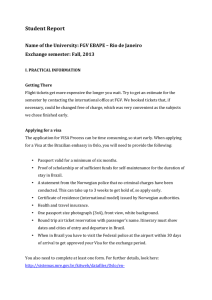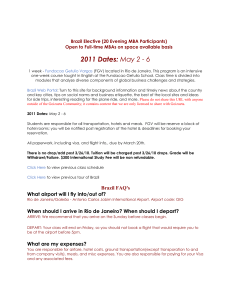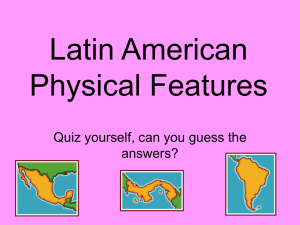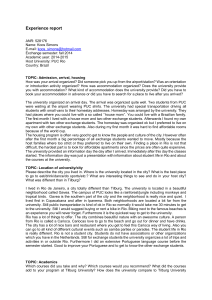FGV Ebape - Fall 2012 - BI Norwegian Business School
advertisement
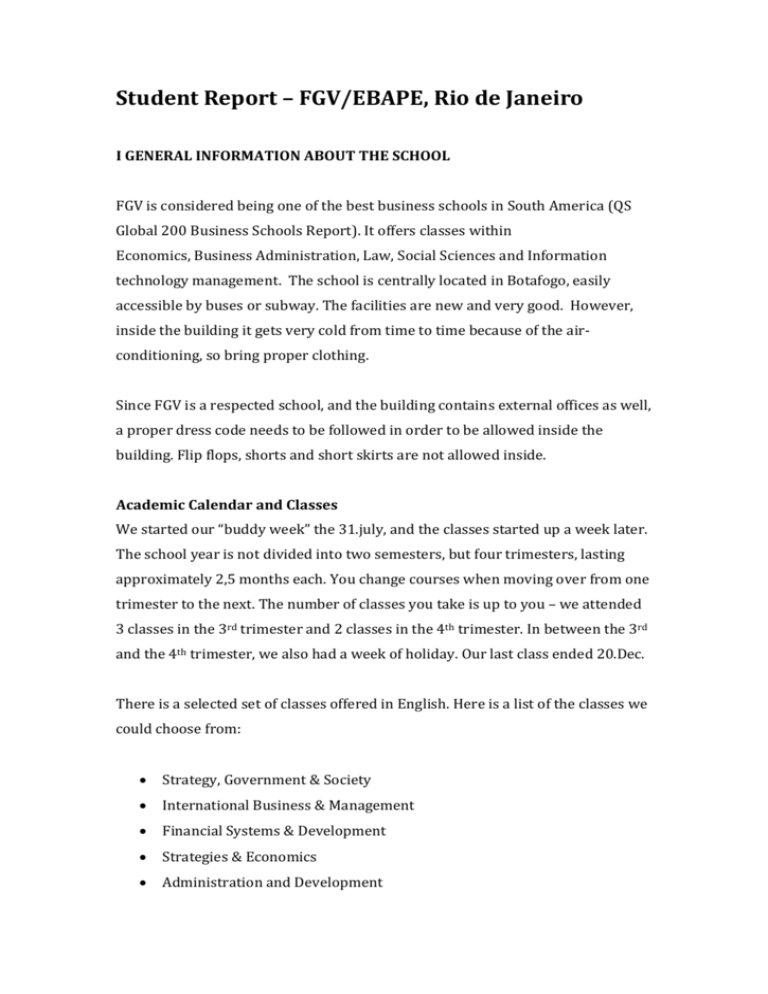
Student Report – FGV/EBAPE, Rio de Janeiro I GENERAL INFORMATION ABOUT THE SCHOOL FGV is considered being one of the best business schools in South America (QS Global 200 Business Schools Report). It offers classes within Economics, Business Administration, Law, Social Sciences and Information technology management. The school is centrally located in Botafogo, easily accessible by buses or subway. The facilities are new and very good. However, inside the building it gets very cold from time to time because of the airconditioning, so bring proper clothing. Since FGV is a respected school, and the building contains external offices as well, a proper dress code needs to be followed in order to be allowed inside the building. Flip flops, shorts and short skirts are not allowed inside. Academic Calendar and Classes We started our “buddy week” the 31.july, and the classes started up a week later. The school year is not divided into two semesters, but four trimesters, lasting approximately 2,5 months each. You change courses when moving over from one trimester to the next. The number of classes you take is up to you – we attended 3 classes in the 3rd trimester and 2 classes in the 4th trimester. In between the 3rd and the 4th trimester, we also had a week of holiday. Our last class ended 20.Dec. There is a selected set of classes offered in English. Here is a list of the classes we could choose from: Strategy, Government & Society International Business & Management Financial Systems & Development Strategies & Economics Administration and Development Financial Institutions Management Industrial Technology and Science Policies The Cognitive Architecture of Decision-Making Accounting Regulatory and Institutional Environment and Earnings Management Research and Development Corporate Finance Population and Public Policies Business Planning In the Sustainable Development Paradigm This list might change year by year but you are likely to be offered something similar. You also have the option to take classes in Portuguese if you are up for the challenge. (It is possible to get a scholarship from Lånekassen of 15,000 NOK if you take a course in Portuguese). In addition to these classes we were offered free Portuguese classes for the first trimester. The classes were very basic, and not too good so if you really want to learn Portuguese there are other schools which are better. I got this recommended from a friend (http://www.facebook.com/taiptforforeigners). The International Office The ladies at the international office are very helpful and easy to get in touch with. You can always ask them for help with anything. Exchange promotion There is a day in the middle of the second trimester where all exchange students should make a presentation of their country and school to promote the exchange possibilities. Social Activities There are very little social activities organized by the school itself, except for a fabulous welcome party and a soccer tournament. But with approximately 65 exchange students there will always be social activities to participate in. It is very easy to get to know the other exchange students, since classes are small and group work common. You can also befriend Intercâmbio-Erasmus Rio de Janeiro on facebook, and get invites to all major events and student parties in Rio. II ACADEMIC INFORMATION The Teaching situation The classes are usually quite small, containing between 5 and 30 students. Classes are mostly characterized by a high degree of oral activity and many presentations. In addition, 75% attendance is mandatory, and you can therefore only miss two classes out of 10 in each subject, without failing the discipline. Required Literature All necessary texts where provided by the teachers. Exams Participation in class usually counted for around 25% of the total grade. Another 50% usually came from group presentations or case work to be handed in. Exams occurred in some classes, but counted usually for 25% of the grade. Other The workload and level of difficulty were lower than at BI, so as long as you do the required cases, presentations etc. you will be all right. III GENERAL INFORMATION ABOUT BRAZIL AND RIO DE JANEIRO Getting there Flight tickets get more and more expensive the longer you wait. Contact the International Office at an early point and try to get an estimate for the semester start. We did not receive any information until April regarding our early start, and flight tickets were therefore already quite expensive. British Airways and KLM provide some of the cheapest tickets available. Visa Procedure The application for VISA Process can be time consuming, so start early. When applying for a Visa at the Brazilian embassy in Oslo, you will need to provide the following: Passport valid for a minimum of six months. Proof of scholarship or of sufficient funds for self-maintenance for the duration of stay in Brazil. A statement from the Norwegian police that no criminal charges have been conducted. This can take up to 3 weeks to get hold of, so apply early. Certificate of residence (international model) issued by Norwegian authorities. Health and travel insurance. One passport size photograph (3x4), front view, white background. Round trip air ticket reservation with passenger’s name. Itinerary must show dates and cities of entry and departure in Brazil. When in Brazil you have to visit the Federal police at the airport within 30 days of arrival to get approved your Visa for the exchange period. You also need to complete at least one form. For further details, look here: http://sistemas.mre.gov.br/kitweb/datafiles/Oslo/enus/file/Vitem%20IV%20undergraduate,%20master%20or%20doctorate%20st udent,%20internship.pdf or contact the Brazilian embassy via mail at: consular@brasil.no. Housing There are no student apartments or similar housing offered by the school in Rio. And finding an apartment in Rio might prove difficult, especially because of the huge language barrier. Most Brazilians speak very poorly English, and it makes thing a lot easier if you get help from one of the Brazilian buddies like we did. Our buddy called around to different landlords and we got hold of an apartment quite fast this way. There will also be provided an information package from the international office at FGV where long lists of different web pages similar to Finn.no are presented. These are good places to start searching for potential flats in Rio. Finding an apartment before you go to Rio is not recommended due to potential fraud. We advise you to check into one of Rios many hostels, which are cheap and a good place to start. The most expensive (and popular) places to live are in the touristic and quite safe areas of Ipanema, Copacabana and Leblon. Here you will live right by the beach, and find everything you need (food, bars/clubs, shopping and transportation) within walking distance. Costs Rio de Janeiro is an expensive city. Housing will amount to approximately 35005500 NOK per person depending on the standard. Food is also pretty expensive but it is still cheaper than in Norway. Of the cheaper goods are alcohol, taxi and meat. You can expect to spend at least 10.000 NOK per month on housing, food, transportation and some fun. Climate Brazil is hot all year round (compared to Norway), but the temperature varies a lot from summer to winter. When we arrived in July, it was winter in Rio, and comfortable temperatures at around 20-25 degrees Celsius. In summer, starting in December, temperatures average at around 35 degrees, and it can get quite exhausting. The weather is often sunny, but periods with cloudy and rainy days are also frequent. Travelling Brazil is a great country to travel in. Quite expensive, but offers amazing things to see and experience. Many of the students went on frequent trips to nearby places such as Ilha Grande, Buzios, Iguazu Falls, Buenos Aires and Florienapolis. Travelling is great fun, and you should definitively go see something other than Rio once you are in Brazil. However, Rio is also surrounded by great hiking opportunities. Especially to recommend are the Dois Irmaôs (where you access the hike through the favela), and Pedra da Gavea, which is one of the more challenging climbs nearby, rewarded by a magnificent view. Surfing is also a popular and easy accessible activity in Rio, and Barra da Tijuca (an hour south of Rio) proves as a great windsurfing spot. We have had an amazing experience staying one semester in Rio de Janeiro, and would recommend you to do the same! Experiencing and getting to know a completely different culture, language and people in magnificent surroundings is really an adventure and learning experience for life. Please feel free to contact us through the international office at BI for any additional information or questions you might have.
